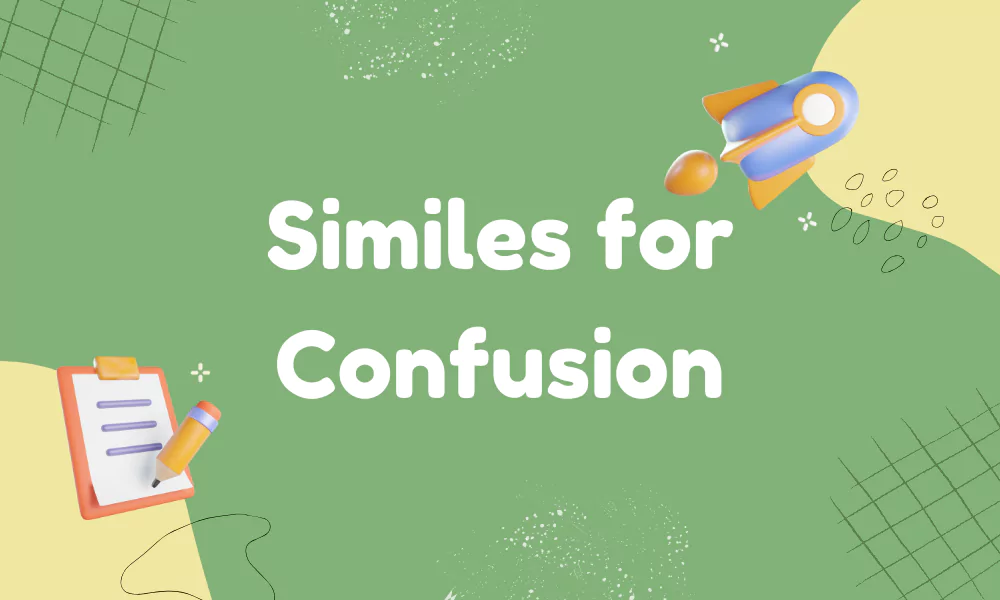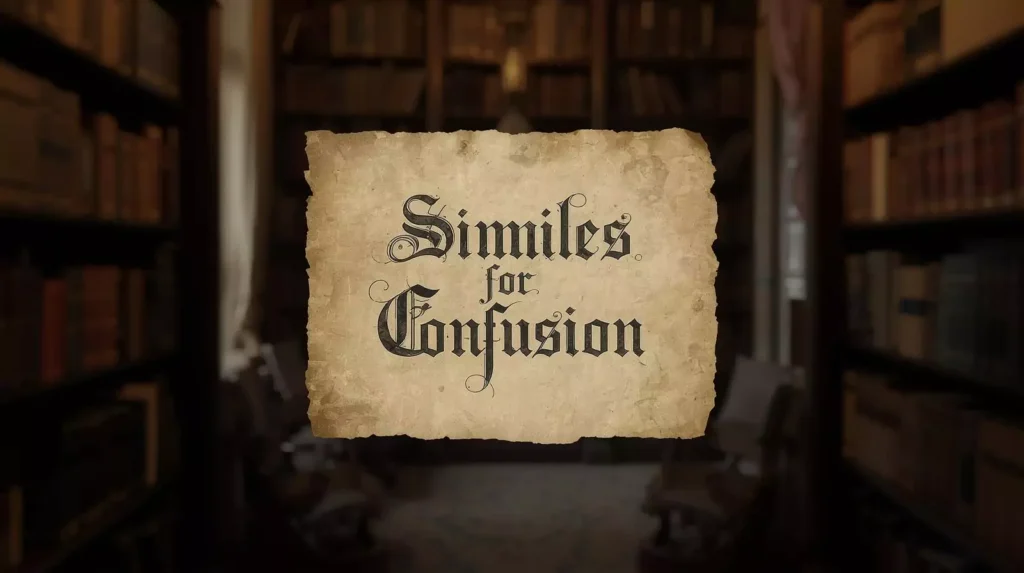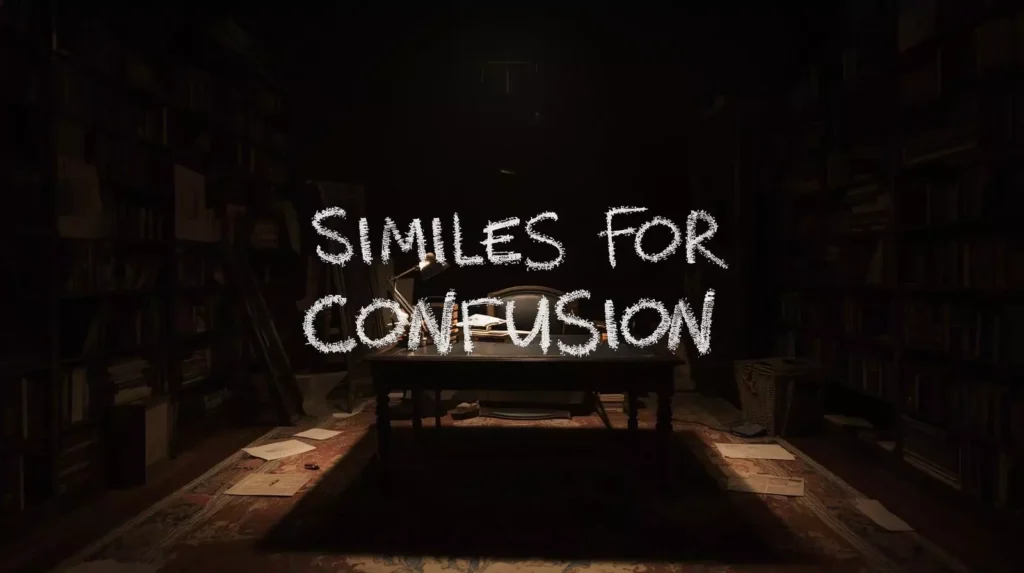Similes for Confusion – Creative Comparisons to Express Uncertainty

Confusion is something we all face whether it’s getting lost in a tricky conversation, staring at a tough math problem, or simply feeling uncertain about what comes next. One of the most creative ways to capture this feeling is through similes, which compare two things using “like” or “as.” Similes make complex emotions easier to understand and add color, humor, or clarity to our words. Instead of just saying, “I’m confused,” you could say, “I’m like a deer caught in headlights,” or “my thoughts are tangled like a ball of yarn.”
What are Similes for Confusion?
Similes for confusion are creative comparisons that describe the feeling of being puzzled, uncertain, or lost by relating it to something more familiar. They use “like” or “as” to paint a vivid picture of what confusion feels like, for example, “like a puzzle with missing pieces” or “as lost as a traveler without a map.” These expressions make emotions easier to understand, add depth to writing, and can even bring humor to an otherwise frustrating moment.

Everyday Similes for Confusion
- Like a deer in headlights
Meaning: Frozen in shock or confusion.
Example: When the teacher asked him an unexpected question, he looked like a deer in headlights. - Like trying to read a foreign language
Meaning: Struggling to understand something unfamiliar.
Example: That physics formula is like trying to read a foreign language to me. - Like a jigsaw puzzle with missing pieces
Meaning: Incomplete understanding.
Example: The story felt like a jigsaw puzzle with missing pieces. - Like finding a needle in a haystack
Meaning: Difficult and confusing task.
Example: Searching through those files was like finding a needle in a haystack. - Like being lost in a maze
Meaning: Feeling trapped and unsure where to go.
Example: The new software menu is like being lost in a maze. - Like a tangled ball of yarn
Meaning: Complicated and unclear thoughts.
Example: My ideas are like a tangled ball of yarn right now. - Like reading hieroglyphics
Meaning: Completely incomprehensible.
Example: This math problem is like reading hieroglyphics. - Like static on a radio
Meaning: Chaotic and unclear signals.
Example: His instructions sounded like static on a radio. - Like walking in circles
Meaning: Making no progress.
Example: Trying to solve that problem felt like walking in circles. - Like a scrambled puzzle
Meaning: Pieces don’t fit together logically.
Example: Her explanation was like a scrambled puzzle. - Like a blindfolded person in the dark
Meaning: Utterly disoriented.
Example: I felt like a blindfolded person in the dark during the exam. - Like being dropped in the deep end
Meaning: Unprepared and confused.
Example: Starting the new job was like being dropped in the deep end. - Like a GPS with no signal
Meaning: Unable to find direction.
Example: Without guidance, I’m like a GPS with no signal. - Like a chicken without a head
Meaning: Rushing around aimlessly.
Example: He was running like a chicken without a head before the meeting. - Like trying to fit a square peg into a round hole
Meaning: Forcing something that doesn’t make sense.
Example: That explanation is like trying to fit a square peg into a round hole. - Like cloudy glasses
Meaning: Unable to see clearly.
Example: The directions were like reading through cloudy glasses. - Like a broken compass
Meaning: No sense of direction.
Example: Her advice was like a broken compass; pointing everywhere. - Like hearing two songs at once
Meaning: Overwhelming and confusing.
Example: My thoughts are like hearing two songs at once. - Like juggling too many balls
Meaning: Overloaded and confused.
Example: With so many tasks, I feel like juggling too many balls. - Like reading upside down
Meaning: Struggling to interpret.
Example: The report looked like reading upside down. - Like a foggy morning
Meaning: Lack of clarity.
Example: My brain feels like a foggy morning today. - Like trying to catch smoke
Meaning: Impossible to grasp.
Example: Understanding his point was like trying to catch smoke. - Like being stuck in quicksand
Meaning: The more you try, the worse it gets.
Example: Explaining the rules was like being stuck in quicksand. - Like an unsolved riddle
Meaning: Something mysterious and puzzling.
Example: Her silence was like an unsolved riddle. - Like scrambled eggs
Meaning: Jumbled up thoughts.
Example: My head feels like scrambled eggs right now. - Like mismatched puzzle pieces
Meaning: Doesn’t fit together.
Example: The data was like mismatched puzzle pieces. - Like trying to untangle Christmas lights
Meaning: Frustratingly complicated.
Example: That project is like trying to untangle Christmas lights. - Like walking in fog
Meaning: Unclear and uncertain path.
Example: Planning the future feels like walking in fog. - Like chasing your own shadow
Meaning: Hopeless and confusing effort.
Example: Understanding his logic was like chasing my own shadow. - Like a TV with bad reception
Meaning: Distorted and unclear.
Example: Her story came across like a TV with bad reception.
Poetic and Literary Similes for Confusion
- Like a moon hidden behind clouds
Meaning: Something obscured from sight.
Example: Her intentions were like a moon hidden behind clouds. - Like a ship adrift at sea
Meaning: Aimless and lost.
Example: Without his guidance, I felt like a ship adrift at sea. - Like stars scattered in the sky
Meaning: Thoughts spread everywhere.
Example: Her ideas were like stars scattered in the sky such as bright but disconnected. - Like whispers in the wind
Meaning: Fleeting, unclear.
Example: His advice was like whispers in the wind. - Like ink spilled on a page
Meaning: Messy and hard to read.
Example: Her emotions were like ink spilled on a page. - Like a forest without paths
Meaning: Lost and directionless.
Example: His arguments were like a forest without paths. - Like a river with too many bends
Meaning: Difficult to follow.
Example: Her explanation was like a river with too many bends. - Like echoes in a canyon
Meaning: Repetitive and unclear.
Example: My questions were like echoes in a canyon, never answered directly. - Like shattered glass on the floor
Meaning: Broken and disordered.
Example: His thoughts were like shattered glass on the floor. - Like mist covering the mountains
Meaning: Obscured clarity.
Example: The truth was like mist covering the mountains. - Like roots tangled underground
Meaning: Complicated, unseen confusion.
Example: Her emotions were like roots tangled underground. - Like a labyrinth with no exit
Meaning: Endless confusion.
Example: The theory felt like a labyrinth with no exit. - Like autumn leaves in the wind
Meaning: Scattered and directionless.
Example: His ideas drifted like autumn leaves in the wind. - Like shadows shifting at dusk
Meaning: Constantly changing, unclear.
Example: Her motives were like shadows shifting at dusk. - Like a storm of broken thoughts
Meaning: Overwhelming mental chaos.
Example: My mind is like a storm of broken thoughts tonight.
Read: Similes for Crying
Gentle and Soft Similes for Confusion
- Like clouds drifting slowly
Meaning: Confusion without urgency.
Example: Her mind wandered like clouds drifting slowly. - Like ripples on water
Meaning: Small waves of uncertainty.
Example: His hesitation was like ripples on water. - Like a foggy window
Meaning: Blurred understanding.
Example: The concept looked like a foggy window to me. - Like a child learning to walk
Meaning: Gentle struggle.
Example: She moved through the new task like a child learning to walk. - Like a song half-remembered
Meaning: Familiar yet unclear.
Example: The memory was like a song half-remembered. - Like petals scattered on the ground
Meaning: Beautiful yet disordered.
Example: Her thoughts were like petals scattered on the ground. - Like a soft breeze shifting directions
Meaning: Gentle uncertainty.
Example: My decisions feel like a soft breeze shifting directions. - Like footprints washed by waves
Meaning: Fading clarity.
Example: Her explanation was like footprints washed by waves. - Like a kite without wind
Meaning: Lacking direction.
Example: Without help, I’m like a kite without wind. - Like trying to recall a dream
Meaning: Elusive and fragile.
Example: The answer was like trying to recall a dream. - Like candlelight flickering
Meaning: Unsteady and faint.
Example: Her focus was like candlelight flickering. - Like a hazy sunset
Meaning: Softly unclear.
Example: His message was like a hazy sunset; pretty but indistinct. - Like the first snowfall
Meaning: Gentle, unexpected uncertainty.
Example: Her confusion was like the first snowfall, quiet but disorienting. - Like a lullaby forgotten mid-tune
Meaning: Calming but incomplete.
Example: The memory was like a lullaby forgotten mid-tune. - Like watercolor running on paper
Meaning: Blurred and blended.
Example: His words were like watercolor running on paper.
Read: Metaphors for Green
Funny or Lighthearted Similes for Confusion
- Like a squirrel in traffic
Meaning: Frantic indecision.
Example: He looked like a squirrel in traffic during the interview. - Like Wi-Fi cutting in and out
Meaning: Thoughts keep dropping.
Example: My brain is like Wi-Fi cutting in and out today. - Like a cat chasing a laser pointer
Meaning: Distracted and confused.
Example: I’m like a cat chasing a laser pointer when I try to multitask. - Like trying to text with oven mitts on
Meaning: Struggling awkwardly.
Example: Using that new phone is like trying to text with oven mitts on. - Like popcorn kernels in a microwave
Meaning: Thoughts popping randomly.
Example: Ideas popped in my head like popcorn kernels in a microwave. - Like a GPS recalculating
Meaning: Constantly redirecting.
Example: My brain is like a GPS recalculating every five seconds. - Like spaghetti on a plate
Meaning: Messy and tangled.
Example: Her logic was like spaghetti on a plate. - Like a dog chasing its tail
Meaning: Pointless repetition.
Example: I felt like a dog chasing its tail during the meeting. - Like trying to herd cats
Meaning: Impossible and chaotic.
Example: Managing that group was like trying to herd cats. - Like socks disappearing in the laundry
Meaning: Things don’t add up.
Example: The budget numbers were like socks disappearing in the laundry. - Like downloading with slow internet
Meaning: Brain working too slowly.
Example: My memory is like downloading with slow internet. - Like a clown at a math exam
Meaning: Completely out of place.
Example: I felt like a clown at a math exam in that coding class. - Like butter on hot toast
Meaning: Melting and spreading everywhere.
Example: My focus is like butter on hot toast; slipping all over. - Like autocorrect gone wrong
Meaning: Making no sense.
Example: Her explanation was like autocorrect gone wrong. - Like a penguin on roller skates
Meaning: Awkward and confused.
Example: I danced like a penguin on roller skates.

Read: Metaphors for Fall
Synonyms For Confusion
| Synonyms | Meanings |
|---|---|
| Bewilderment | A state of being perplexed or puzzled. |
| Perplexity | Inability to understand something clearly. |
| Uncertainty | Not sure or confident about a situation. |
| Disorientation | Loss of sense of direction or clarity. |
| Bafflement | Total puzzlement and inability to explain. |
| Mystification | A feeling of being utterly bewildered. |
| Tangle | A messy or complicated situation. |
| Puzzlement | A moment of doubt or questioning. |
| Obscurity | Lack of clear meaning or understanding. |
| Turmoil | A state of mental or emotional confusion. |
Tips for Creating Your Own Confusion Similes
- Start with the feeling – Ask yourself: How does my confusion feel? Messy, foggy, overwhelming, or funny?
- Pick a relatable image – Choose something everyone recognizes, like puzzles, fog, tangled cords, or lost maps.
- Use “like” or “as” creatively – Keep the structure simple: “like a…” or “as…” to instantly form a simile.
- Match the tone – For a serious piece, use poetic or soft comparisons (like mist over mountains). For humor, go quirky (like Wi-Fi cutting out).
- Experiment and play – The best similes come from everyday life. Think about your experiences and twist them into comparisons. Example: “My thoughts were like browser tabs I forgot to close.”
Read: Abbreviation for Academy
FAQs
Conclusion
Confusion is a universal feeling, and similes give us a creative way to express it with clarity, humor, or poetic depth. Whether you’re writing an essay, crafting a story, or simply trying to explain your own thoughts, similes can turn a vague state of mind into a vivid image. From everyday comparisons like “a deer in headlights” to lighthearted ones like “a penguin on roller skates,” these expressions make communication more relatable and engaging.
